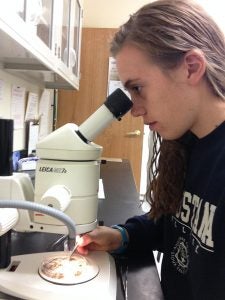When most people think of the South Dakota FFA program, the last thing that probably comes to mind is aquaculture, but a lifelong fascination to fields and streams is what led one Augustana University student to a successful pursuit in aquatic research and to the prestigious title of National FFA 2016 American Star in Agriscience.
“As a kid, I loved flipping over rocks in streams and creeks to find aquatic insects,” said Elizabeth Renner, this year’s American Star in Agriscience recipient. “I developed this fascination with learning how to identify organisms and would carry around a leaf press and sample jars for collecting things. That passion for spending time outdoors morphed into a curiosity for the science behind aquatic ecosystems.”
The sixth generation to live on her family’s homestead, Renner grew up on an acreage near Crooks, South Dakota. While she wasn’t necessarily raised on the water, Renner developed a deep appreciation for the outdoors during her childhood … fishing with her grandpa, gardening with her mother, and running around outside with her brother.
The West Central FFA member’s first opportunity to complete scientific research on aquatic organisms came through her involvement in an FFA Agriscience Fair her freshman year. Her scientific explorations continued through high school and even included an internship with USDA’s Natural Resources Conservation Service.
When Renner entered Augustana, her research continued ‘full-stream’ ahead. Following her freshman year, she conducted research with a professor on historic plant communities to see how ecosystems changed following the arrival of European settlers. During the summer of her sophomore year, she conducted stream surveys at bridge and box culvert construction sites for the South Dakota Department of Transportation. Renner then took a position at a stream ecology laboratory at an Alaskan nonprofit dedicated to protecting salmon streams within the Cook Inlet watershed. The senior’s current study is examining how climate change influences stream organisms.
Renner attributes her research success to persistence.

“Doing field research takes patience, because equipment can fail or results can come back as statistically insignificant,” Renner said. I think my work ethic and unwillingness to give up have gotten me to where I am today.”
Renner’s research has also led her to think more progressively about conserving her home state’s waterways.
“South Dakota actually has a large number of water bodies that have become impaired due to agricultural practices. We have lost thousands of acres of wetlands and grasslands, which act as natural filters that prevent runoff and soil erosion,” Renner said. “The Big Sioux River is consistently ranked as one of the most polluted rivers in the country, and much of that stems from eutrophication caused by agriculture. We need to be investing in conservation programs that incentivize wise land stewardship, such as the CRP program or the cost-share program that pays farmers to maintain buffer strips and grass waterways.”
Upon graduation, Renner plans to pursue a doctorate in aquatic ecology and hopes to conduct research on aquatic ecosystems as an environmental consultant to federal agencies such as the U.S. Fish and Wildlife Service and the Environmental Protection Agency.
After all of her research Renner now feels called to educate the public about the importance of aquatic organisms and wetlands for the health of communities.
“Agriculture is a very interdisciplinary field. There is a growing need for agronomists and animal scientists who understand the environmental impacts of production agriculture on our soil, water, and air,” Renner said. “There are a ton of opportunities for students to get involved in research that helps us understand these impacts and find solutions to pressing problems.”
Renner credits her West Central, South Dakota FFA advisor and mentor Linda Petersen for giving her the initial push into aquatic research.
“She cultivated my passion for the great outdoors and encouraged me to pursue my interests as a vocation,” Renner said. “She has been an outstanding voice for women in STEM and agriculture, and I would not be where I am today without her support and guidance.”
Renner said those opportunities through South Dakota FFA and her Supervised Agricultural Experience (SAE) directly influenced her chosen vocation.
“I feel so honored and blessed to have finished my career in the FFA on a high note. Receiving this recognition was a dream come true after almost eight years and thousands of hours invested into my SAE,” Renner said. “I’d like to let all FFA members know that anything is possible if you pursue your passions with tenacity and never give up. What it means to wear the blue is truly up to you.”



